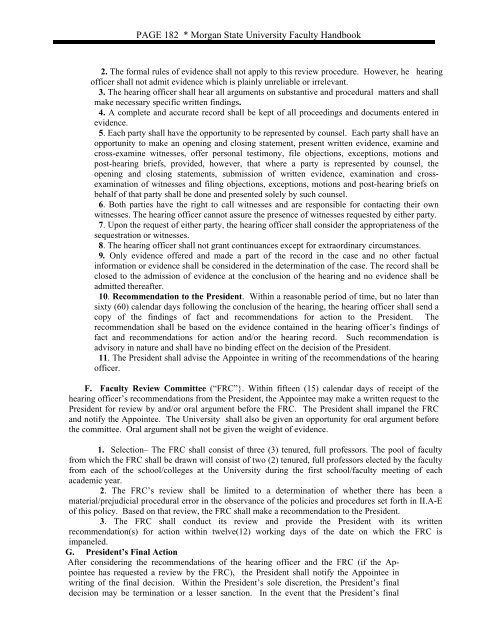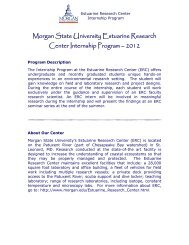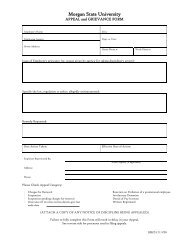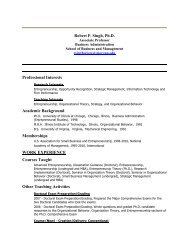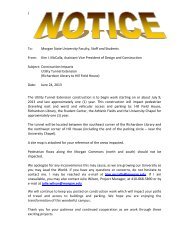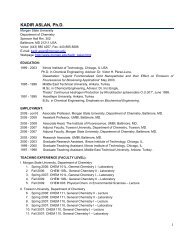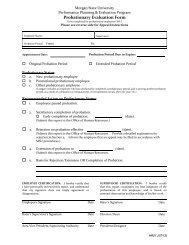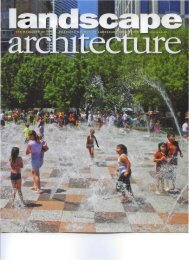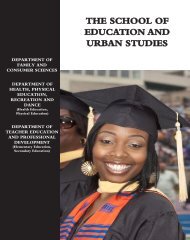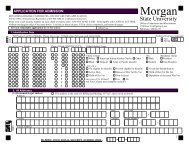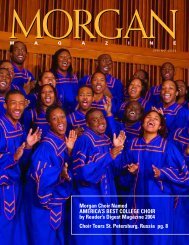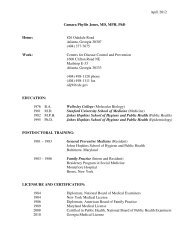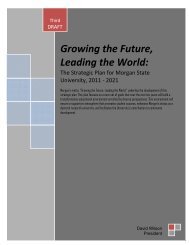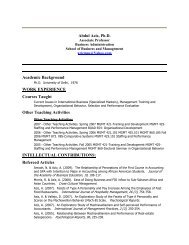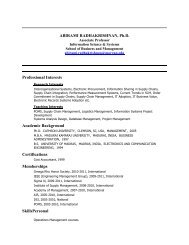FACULTY HANDBOOK July 2009 - Morgan State University
FACULTY HANDBOOK July 2009 - Morgan State University
FACULTY HANDBOOK July 2009 - Morgan State University
Create successful ePaper yourself
Turn your PDF publications into a flip-book with our unique Google optimized e-Paper software.
PAGE 182 * <strong>Morgan</strong> <strong>State</strong> <strong>University</strong> Faculty Handbook2. The formal rules of evidence shall not apply to this review procedure. However, he hearingofficer shall not admit evidence which is plainly unreliable or irrelevant.3. The hearing officer shall hear all arguments on substantive and procedural matters and shallmake necessary specific written findings.4. A complete and accurate record shall be kept of all proceedings and documents entered inevidence.5. Each party shall have the opportunity to be represented by counsel. Each party shall have anopportunity to make an opening and closing statement, present written evidence, examine andcross-examine witnesses, offer personal testimony, file objections, exceptions, motions andpost-hearing briefs, provided, however, that where a party is represented by counsel, theopening and closing statements, submission of written evidence, examination and crossexaminationof witnesses and filing objections, exceptions, motions and post-hearing briefs onbehalf of that party shall be done and presented solely by such counsel.6. Both parties have the right to call witnesses and are responsible for contacting their ownwitnesses. The hearing officer cannot assure the presence of witnesses requested by either party.7. Upon the request of either party, the hearing officer shall consider the appropriateness of thesequestration or witnesses.8. The hearing officer shall not grant continuances except for extraordinary circumstances.9. Only evidence offered and made a part of the record in the case and no other factualinformation or evidence shall be considered in the determination of the case. The record shall beclosed to the admission of evidence at the conclusion of the hearing and no evidence shall beadmitted thereafter.10. Recommendation to the President. Within a reasonable period of time, but no later thansixty (60) calendar days following the conclusion of the hearing, the hearing officer shall send acopy of the findings of fact and recommendations for action to the President. Therecommendation shall be based on the evidence contained in the hearing officer’s findings offact and recommendations for action and/or the hearing record. Such recommendation isadvisory in nature and shall have no binding effect on the decision of the President.11. The President shall advise the Appointee in writing of the recommendations of the hearingofficer.F. Faculty Review Committee (“FRC”}. Within fifteen (15) calendar days of receipt of thehearing officer’s recommendations from the President, the Appointee may make a written request to thePresident for review by and/or oral argument before the FRC. The President shall impanel the FRCand notify the Appointee. The <strong>University</strong> shall also be given an opportunity for oral argument beforethe committee. Oral argument shall not be given the weight of evidence.1. Selection– The FRC shall consist of three (3) tenured, full professors. The pool of facultyfrom which the FRC shall be drawn will consist of two (2) tenured, full professors elected by the facultyfrom each of the school/colleges at the <strong>University</strong> during the first school/faculty meeting of eachacademic year.2. The FRC’s review shall be limited to a determination of whether there has been amaterial/prejudicial procedural error in the observance of the policies and procedures set forth in II.A-Eof this policy. Based on that review, the FRC shall make a recommendation to the President.3. The FRC shall conduct its review and provide the President with its writtenrecommendation(s) for action within twelve(12) working days of the date on which the FRC isimpaneled.G. President’s Final ActionAfter considering the recommendations of the hearing officer and the FRC (if the Appointeehas requested a review by the FRC), the President shall notify the Appointee inwriting of the final decision. Within the President’s sole discretion, the President’s finaldecision may be termination or a lesser sanction. In the event that the President’s final


